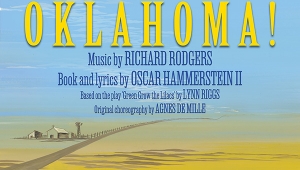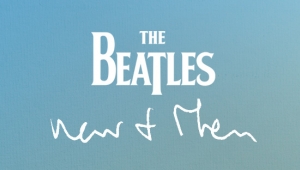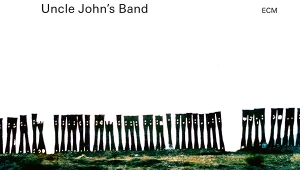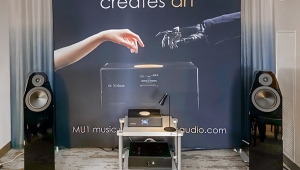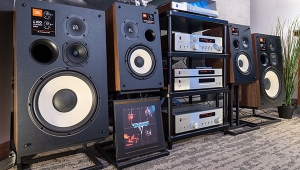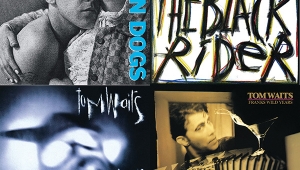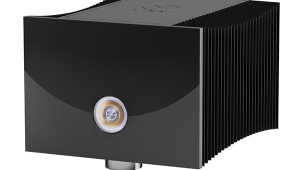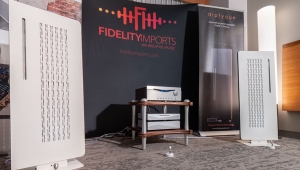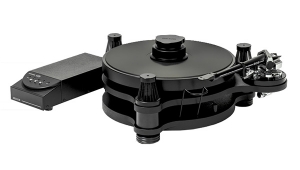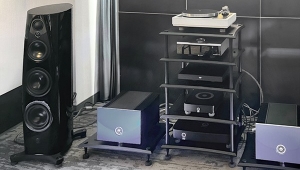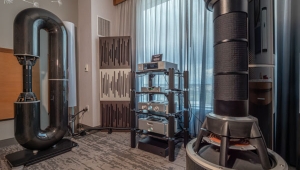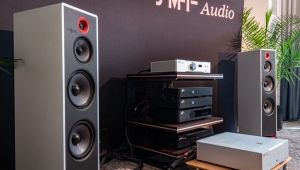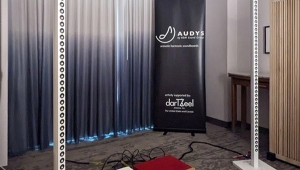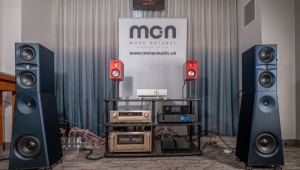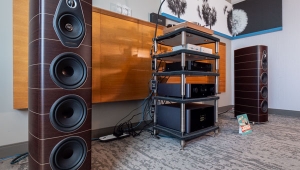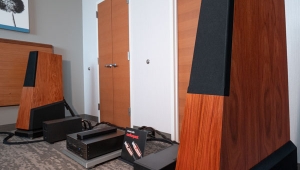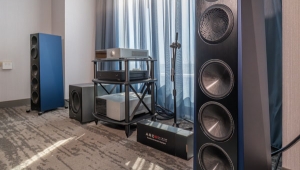| Columns Retired Columns & Blogs |
February 2024 Rock/Pop Record Reviews
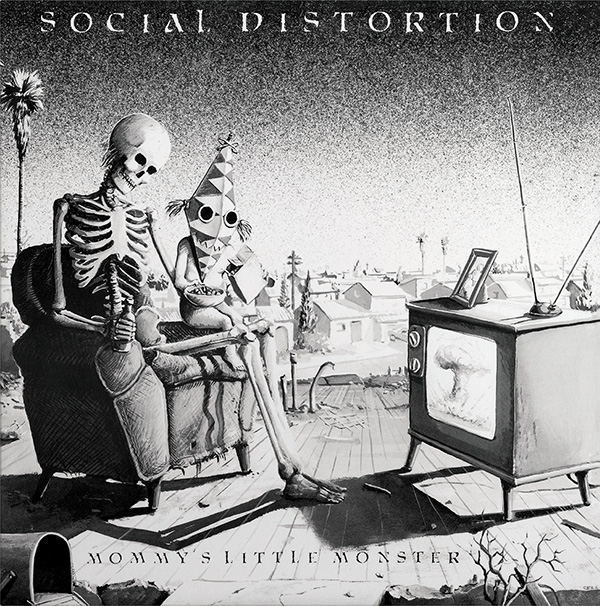
Social Distortion: Mommy's Little Monster, 40th Anniversary Edition
Craft Recordings CR00679 (auditioned as LP). 2023. Chaz Ramirez, Social Distortion, prods.; Ramirez, Chris Bellman, engs.
Performance *****
Sonics ****
Craft Recordings CR00679 (auditioned as LP). 2023. Chaz Ramirez, Social Distortion, prods.; Ramirez, Chris Bellman, engs.
Performance *****
Sonics ****
Social Distortion uniquely melded country, blues, rock, and of course hardcore punk into a sound that's a baseline for what's now known as "SoCal Punk." Acts like Bruce Springsteen, Green Day, Rancid, and Blink-182 joined the fan base that emerged when the band released 1983's Mommy's Little Monster on their own 13th Floor Records label.
Front man, lead singer, and guitarist Mike Ness was thrown out of his home by his father when he was 15. This record was released six years later. It contains no ballads, time signature changes, or strings. Such songs as "The Creeps (I Just Wanna Give You)," "Another State of Mind," and the title track comprise this tight, nine-song, 28-minute album, recorded in a single marathon session at Fullerton, California's Casbah Studio. The album drips with tales of a violent childhood and a feeling of authenticity that stands out among records of the time.
The original record delivered a sense of intensity and angst. Sound quality was a distant second.
Craft Recordings celebrates the record's 40th anniversary with a reissue remastered for vinyl from the original analog tapes. Guitar solos have more sonic scope. Vocals seem better separated from the chaos. It all feels more spacious and approachable. Circa 2023, it's rare to run through a record so quickly. A record this length seems perfectly suited for vinyl—its original format of course. (A cassette tape version followed two years later.) The package is nice, if basic for an anniversary reissue. The vinyl arrives in a gatefold jacket, like the original, but with no new liner notes to provide context and no bonus material. Still, this reissue helps tell that story with better definition that better fuels this powerful narrative.—Ray Chelstowski

Mötley Crüe: Shout at the Devil 40th Anniversary Edition
BMG 881288, reviewed from LP. 1983/2023. Tom Werman, prod.; Geoff Workman, Andy Pearce, engs.
Performance ****
Sonics ***½
Nowadays, Mötley Crüe is best known for scandals at levels to which Justin Bieber could only hope to one day approach: Tommy Lee's sex tapes, vehicular manslaughter of Hanoi Rocks drummer Nicholas "Razzle" Dingley by singer Vince Neil, near-ODs, Nikki Sixx's penchant for marrying Playboy Playmates and having near-death heroin experiences. They say that any attention is good, but is being the subject of the highest-rated episode of VH1's Behind the Music, or having your autobiography dramatized by Netflix, really a good thing?
Mötley Crüe's brand of hedonistic metal is an anachronism in 2023—they called themselves "the world's most notorious rock band"—but there was a time when they were the hottest thing in the glam-metal universe, dominating MTV. They have sold more than 100 million albums and notched several platinum record certifications. Yet, like most metal bands, they continue to be snubbed by the Rock & Roll Hall of Fame, even as rappers and country artists are admitted.
Mötley Crüe was founded by Nikki Sixx and Tommy Lee in 1981. The lineup stabilized when Mick Mars and Neil came on board. When the band's first full-length release, Too Fast for Love, recorded at L.A.'s Hit City West and issued in limited quantity on the band's own label, Leathür Records, was remixed and reissued by Elektra in 1982, the timing could not have been better. MTV had just gone live, and the band harnessed the new format with over-the-top theatrics for the screen.
Produced by Tom Werman (Ted Nugent; Molly Hatchet) with Geoff Workman behind the board (King Crimson; Journey), Shout at the Devil came out in September 1983 on Elektra, going gold in three months, platinum a month later, and ultimately selling more than 4 million copies. The video for "Looks That Kill" was a low point in 1980s misogyny, and during the tour in support of the album, with Van Halen and AC/DC, Neil bit Eddie Van Halen, Lee bit Malcolm Young, and Lee had a fistfight with David Lee Roth, almost getting the band kicked off the bill.
Shout at the Devil celebrates its ruby anniversary with a boxed set that recalls all the excesses of its decade. Included in the box is the remastered album on yellow splatter vinyl, a compact disc, and a cassette. A second LP contains "Demos & Rarities." Tunes from the first two albums are stashed on a pair of 7" EPs. Also in the box are lithographic prints of the cover art, tarot cards featuring the band members, a Ouija board with a planchette embossed with the band's logo, a pentagram séance board, a pentagram 7" adapter in a felt pentagram bag, the obligatory bandanna, and a black, devil-head candleholder with eye slots through which, when in use, a flame ominously flickers. Despite the huge pentagram on the cover of the box, or maybe because of it, this set would make a hell of Christmas gift.
If you are going to own one Mötley Crüe album, Shout at the Devil is the one to own—either that or the band's catchiest, most successful release, Dr. Feelgood, made when they were working on collective sobriety, which is akin to going from a monster truck rally to a demonstration of driverless cars.
The pairing of the title track and "Looks That Kill" is a glam-metal high point. The one-minute, 30-second multitracked Mars instrumental "God Bless the Children of the Beast" is cute, while the cover of The Beatles' "Helter Skelter," done without a hint of apparent irony, is nicely updated for the era. If there can be a deep cut on a platinum album, it is "Knock 'Em Dead, Kid," inspired—inspired!—by a beatdown Sixx received from undercover cops posing as a biker gang. "Dedicated to the LAPD" is written on the LP's inner sleeve.
The coolest part about the set, apart from that devil candleholder, is the demos and rarities LP. The A side has alternate takes of the title track, "Looks That Kill," "Knock 'Em Dead, Kid," and "Too Young to Fall in Love"—all equal to or better than the final product. The B side has three punchy Sixx tunes recorded at the sessions but left off the album, all as good as if not superior to those kept in their place—"Hotter Than Hell" (becoming "Louder Than Hell" on the next album, Theatre of Pain), "I Will Survive," and "Black Widow"—plus some snippets of backward chanting and music, playing into the "Satanic" theme.
This is what Shout at the Devil should have been from the beginning.—Andrey Henkin

The Allman Brothers Band: Bear's Sonic Journals: Allman Brothers Band Fillmore East February 1970
The Owsley Stanley Foundation & The Allman Brothers Band Recording Company (auditioned as LP). 2023. Pete Bell, prod.; Owsley Stanley, Paul Stubblebine, eng.
Performance *****
Sonics ****
The Allman Brothers never had the live-recording resources of The Grateful Dead and other contemporaries. They'd record shows as best they could, and if it wasn't a good show, they'd record over that performance at a future gig. As a result, there are voids in the band's musical history, noteworthy performances lost or never put to tape.
In 1997, the Allman Brothers Band, in tandem with the Owsley Stanley Foundation, released Bear's Sonic Journals: Allman Brothers Band Fillmore East February 1970. It presents restored and mastered recordings of the Allman Brothers Band's performances at New York City's Fillmore East on February 11, 13, and 14, 1970, captured by legendary Dead soundman Owsley "Bear" Stanley. They now present what will be the last physical version of that music that will ever be released. A limited edition (only 5000 copies) in orange vinyl celebrates the work of Owsley and presents the earliest and best sound quality of the original Allman Brothers lineup.
In February 1970, the Allman Brothers Band had only been together for 11 months. At the Fillmore, Owsley, who had no prior experience mixing their music, rolled tape. The result is a seven-song set featuring blues covers "Mountain Jam" and "Whipping Post" plus the opener, the earliest known live recording of "In Memory of Elizabeth Reed," which had been written shortly before these shows. The sound is slightly muted and doesn't shine quite as brightly as their best-known live recordings, but it has a warmth that makes some of the jams feel more intimate.
At the time of this recording, they had released only one studio record. This show captures a band that had quickly caught its footing and was just about to break big and wide.—Ray Chelstowski
- Log in or register to post comments











